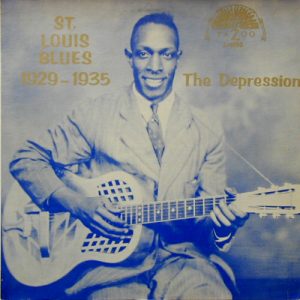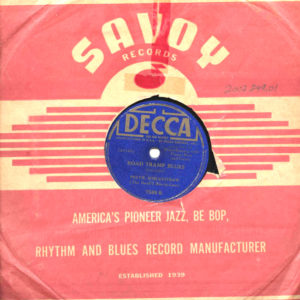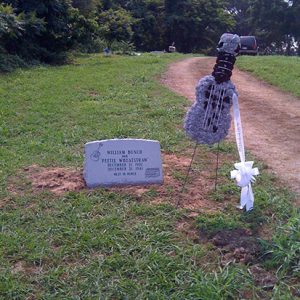calsfoundation@cals.org
William Bunch (1902–1941)
aka: Peetie Wheatstraw
William Bunch, known as “Peetie Wheatstraw,” was raised in Cotton Plant (Woodruff County) and became one of the most popular and widely imitated bluesman of the 1930s and 1940s. He was an incredibly successful pianist, recording more than 160 songs between 1930 and his death in 1941.
William Bunch was born on December 21, 1902, in Ripley, Tennessee, although some accounts list Bunch’s birthplace as Arkansas. Bluesman Big Joe Williams, who recorded with Bunch, stated: “Peetie come from Cotton Plant, Arkansas.” Bunch’s family was living in Cotton Plant soon after his birth. Cotton Plant was a local cultural center in the early 1900s, and Bunch began playing both piano and guitar there at a young age. Around 1920, all members of the Bunch family were farm laborers. This family included the head of the household, Jim; his wife, Mary; and their four sons and three daughters. In 1927, Bunch left Cotton Plant to travel throughout the Deep South as a musician.
In 1929, Bunch moved north to play venues in East St. Louis, Illinois, and across the river in St. Louis, Missouri. At this time, he was a capable musician with a new name, Peetie Wheatstraw. The name was derived from African-American folklore and referred to the evil half of a twin personality. He also used “the High Sheriff of Hell” and “the Devil’s Son-in-Law” as nicknames during his recording career. According to ethnomusicologist Robert Palmer, Bunch’s music was characterized by his “two-fisted barrelhouse piano work” and his “falsetto cry, ‘Ooh, well, well,’ that he tended to insert at the end of almost every verse.” Bunch began recording in Chicago, Illinois, in 1930 and recorded more than 160 songs for the Vocalion, Decca, and Bluebird labels, including such tunes as “Tennessee Peaches Blues” (1930), “Six Weeks Old Blues” (1931), and “Peetie Wheatstraw Stomp” (1937).
Bunch lived in East St. Louis starting in 1929, where he frequently played piano in local clubs and bars. He died on his thirty-ninth birthday, December 21, 1941, when the car he was riding in failed to make a curve and struck a standing freight train. He was less than a block from his home. The other two passengers, both of whom died, were a packing house worker and a steel plant worker. His body was shipped to Cotton Plant for burial.
Bunch was tremendously popular on the national blues scene and had a profound influence on many bluesmen playing in Arkansas during the 1930s and 1940s. Robert Johnson borrowed many lyrical ideas from him, and Bunch’s influence could later be heard in the music of Big Bill Broonzy and Muddy Waters.
On June 4, 2011, the Bunch family, the Sonny Boy Blues Society, and the National Trust for Historic Preservation dedicated a Delta Music Trail Marker in Cotton Plant for Bunch. A grave marker was also dedicated, and Governor Mike Beebe proclaimed the day Peetie Wheatstraw Day.
For additional information:
Garon, Paul. The Devil’s Son-in-Law: The Story of Peetie Wheatstraw and His Songs. Revised ed. Chicago: Charles H. Kerr, 2003.
Palmer, Robert. Deep Blues. New York: Viking Press, 1981.
Jamie Metrailer
Central Arkansas Library System
 Early Twentieth Century, 1901 through 1940
Early Twentieth Century, 1901 through 1940 William Bunch
William Bunch  Peetie Wheatstraw Recording
Peetie Wheatstraw Recording  Peetie Wheatstraw Grave Marker
Peetie Wheatstraw Grave Marker 




I went to school in Cotton Plant, and farm life as sharecroppers was a step above the worst. We moved in 1969 to Flint, Michigan, trying to find a better life. Thanks to my parents, we got out. I didn’t know Peetie personally, but I know some of his family. They seem to be doing well.